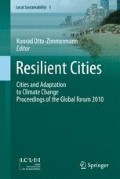Abstract
This paper develops governance recommendations for urban adaptation strategies based on case studies in urban regions of five European countries, a European expert survey on guiding principles for adaptation to climate change (including more than 250 experts from all EU countries) and literature on adaptation to climate change. The case studies show that adaptation to climate change is influenced by social factors such as education, skills, values, perceptions, interests, customs, stakeholder participation and the cooperative structures between different sectors, communities, regions and policy levels. Social factors should therefore be explicitly addressed in adaptation strategies; if not taken into account, they can become significant barriers to adaptation. To adequately address social factors, every adaptation strategy should include learning, cooperation and communication strategies, which are best formulated at the local level.
Four case studies were carried out in the context of a study in the European Alps conducted by several European partners including Potsdam Institute for Climate Impact Research, Germany. The study was mainly funded by the European Environment Agency (EEA). The fifth case study is carried out by the German project consortium ‘nordwest2050’ including the University of Oldenburg. The project is funded by the Federal Ministry of Education and Research. The European expert survey on guiding principles for adaptation was conducted by the Potsdam Institute for Climate Impact Research as part of a project funded by the EEA.
Access this chapter
Tax calculation will be finalised at checkout
Purchases are for personal use only
Notes
- 1.
Most of the results of the case studies were published in 2009 as a report by the European Environment Agency (see EEA 2009).
- 2.
For more information see www.nordwest2050.de
References
Adger WN, Agrawala S, Mirza MMQ et al (2007) Assessment of adaptation practices, options, constraints and capacity. In: Parry ML, Canziani OF, Palutikof JP et al (eds) Climate Change 2007: impacts adaptation and vulnerability. Contribution of Working Group II to the Fourth Assessment Report of the Intergovernmental Panel on Climate Change, Cambridge University Press, Cambridge, pp 717–743
European Environment Agency (EEA) (2009) Regional climate change and adaptation. The Alps facing the challenge of changing water resources. EEA Report No 8/2009. Available via http://www.eea.europa.eu/publications/alps-climate-change-and-adaptation-2009. Cited 4 June 2010
Grothmann T (2009) The regional perspective: overview and methodology of regional case studies. In: European Environment Agency (ed) Regional climate change and adaptation. The Alps facing the challenge of changing water resources. EEA Report No 8/2009, pp 63–65 Available via http://www.eea.europa.eu/publications/alps-climate-change-and-adaptation-2009. Cited 4 June 2010
Grothmann T, Nenz D, Pütz M (2009) Adaptation in vulnerable alpine regions – lessons learnt from regional case studies. In: European Environment Agency (ed) Regional climate change and adaptation. The Alps facing the challenge of changing water resources. EEA Report No 8/2009, pp 96–108. Available via http://www.eea.europa.eu/publications/alps-climate-change-and-adaptation-2009. Cited 4 June 2010
Gupta J, Termeer K, Klostermann J et al (2010) The adaptive capacity wheel: a method to assess the inherent characteristics of institutions to enable the adaptive capacity of society. Environ Sci Pol 13(6):459–471
Newig J, Pahl-Wostl C, Sigel K (2005) The role of public participation in managing uncertainty in the implementation of the Water Framework Directive. Eur Environ 15(6):333–343
Pahl-Wostl C (2007) Transitions towards adaptive management of water facing climate and global change. Water Resour Manag 21(1):49–62
Prutsch A, Grothmann T, Schauser I, et al (2010) Guiding principles for adaptation to climate change in Europe. ETC/ACC Technical Paper 2010/6. Available via http://air-climate.eionet.europa.eu/reports/#tp. Cited 9 Nov. 2010
Ruth M (2006) A summary of lessons and options. In: Ruth M (ed) Smart growth and climate change: regional development, infrastructure and adaptation. Edward Elgar, Cheltenham, pp 393–399
Author information
Authors and Affiliations
Corresponding author
Editor information
Editors and Affiliations
Rights and permissions
Copyright information
© 2011 Springer Science+Business Media B.V.
About this paper
Cite this paper
Grothmann, T. (2011). Governance Recommendations for Adaptation in European Urban Regions: Results from Five Case Studies and a European Expert Survey. In: Otto-Zimmermann, K. (eds) Resilient Cities. Local Sustainability, vol 1. Springer, Dordrecht. https://doi.org/10.1007/978-94-007-0785-6_17
Download citation
DOI: https://doi.org/10.1007/978-94-007-0785-6_17
Published:
Publisher Name: Springer, Dordrecht
Print ISBN: 978-94-007-0784-9
Online ISBN: 978-94-007-0785-6
eBook Packages: Earth and Environmental ScienceEarth and Environmental Science (R0)

